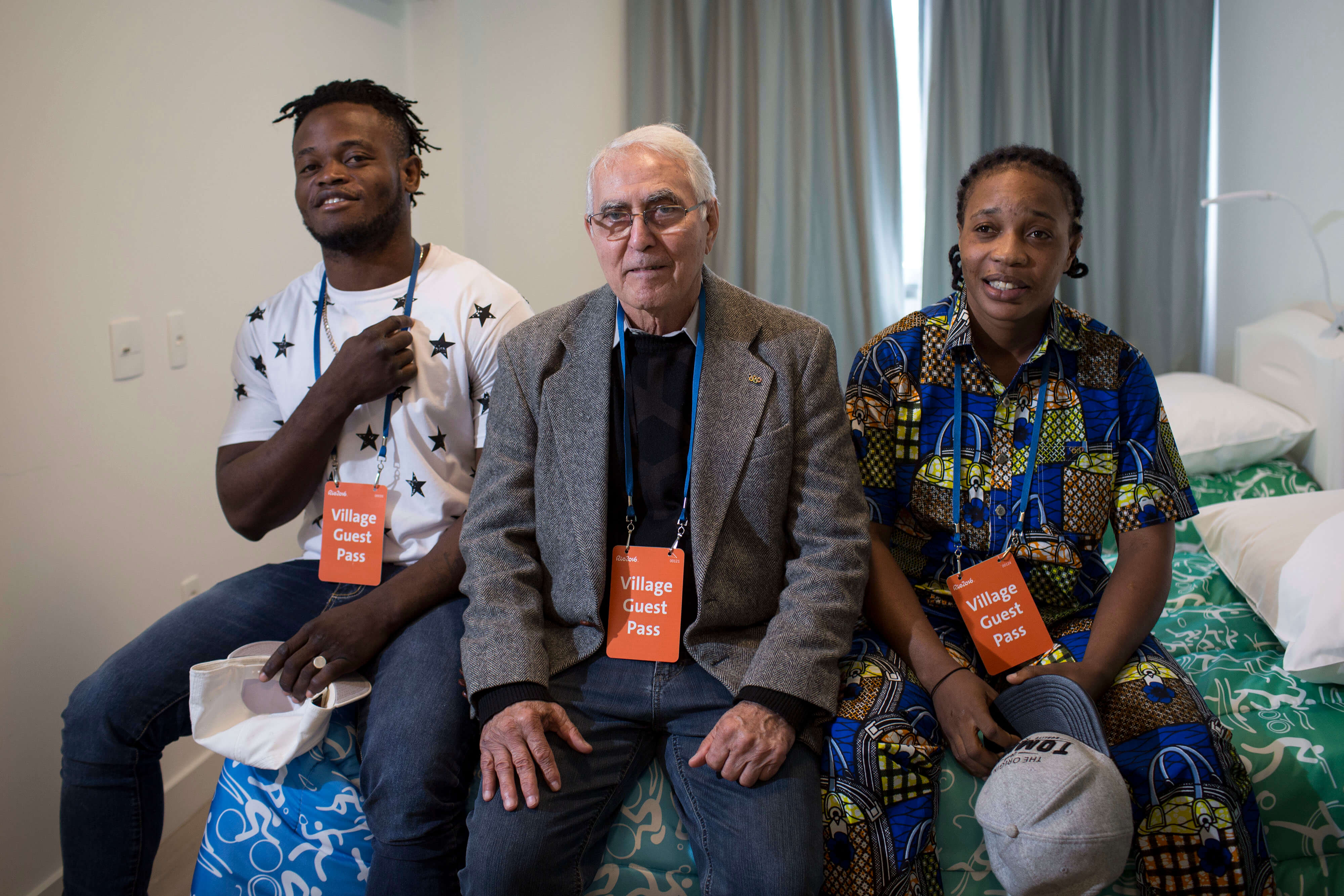Summer Olympics 2016: Rio de Janeiro

What to expect at the 2016 Summer Olympic Games
 Â Â Two refugee athletes with their coach Related Links |
Uniquely Olympic
The 2016 Summer Olympics offers many firsts for the international competition. The 2016 Olympics, set to start on August 5, is taking place for the first time ever in Rio de Janeiro, Brazil. This is the only Summer Olympics to be held in South America; what's more, it is the first time the Summer Olympics is taking place in the host countryâs winter season. Rio 2016 is already setting records, with the highest amount of nations competing—206—including new participants South Sudan and Kosovo. Along with these two additions, Rio 2016 will be the first Olympics to have a refugee team, the Refugee Olympic Team (ROT).The idea is that this team, made up of refugee athletes from South Sudan, Congo, Syria, and Ethiopia, will give hope to those suffering from the refugee crisis globally.
A New World
It only makes sense that an Olympics with so many firsts would have an equally unique slogan, âA New World.â The slogan was announced June 14, 2016, by Thomas Bach, the president of the International Olympic Committee (IOC) in a ceremony at the Barra Olympic Park, "It is what the Olympic movement is all about—changing the world for the better.â Along with the slogan, this yearâs Olympics includes a manifesto that channels values of unity, acceptance, diversity, and the will for change.
Olympic Dreams or Nightmares?
Along with these ground-breaking firsts, there are some behind-the-scenes issues that threaten the glory of the Games. A 2015 World Anti-Doping Agency (WADA) report revealed evidence of a Russian state-sponsored doping program. WADA issued a recommendation of a blanket ban for all Russian athletes. But the governing body of the Games, the International Olympic Committee (IOC,) decided that individual sporting federations must rule on whether Russians can compete. Each International Sports Federation, which is a committee recognized by the IOC that regulates a specific sport and the participants, must clear the Russian athletes in that sport. Then, the decisions must be ratified by the Court of Arbitration for Sport (CAS). Many of the athletes have been cleared, including the Russian fencing team, the volleyball teams, the badminton team, the gymnastics team, table tennis, shooting, equestrian, and judo. The sport most impacted by the ban is track, with a total elimination of the team. The rowing squad will have only 6 of 28 athletes participating, while swimming will only bring 7 athletes to the Games.
Zika Wreaks Havoc
By this time, Zika and Olympics are pretty well connected. Concerns over the deadly Zika virus have continued to spread along with the disease, with some athletes choosing not to attend the games in fear of contracting the virus. The World Health Organization declared Zika an international public health concern. Famous Irish golfer Rory McIlroy announced in June that he would not be attending the games along with other notable athletes. Some believe that the Summer Games should have been postponed or relocated; Canadian scientist and professor Amir Attaran wrote in an open letter posted on the Harvard Public Health Review, "Simply put, Zika infection is more dangerous, and Brazilâs outbreak more extensive, than scientists reckoned a short time ago. Which leads to a bitter truth: the 2016 Olympic and Paralympic Games must be postponed, moved, or both, as a precautionary concession." However the Games were neither postponed or moved and will still take place on August 5, 2016.
Housing and H2O
Then, there is the infrastructure. . .and the water. The Olympic Village, where the athletes are supposed to live for the duration of the Games, is not up to some countries' standards. The Australian team arrived to find their building had a multitude of plumbing, electrical and gas issues, with exposed wires, broken toilets, and large puddles throughout the building. The mayor of Rio, Eduardo Paes, made a public statement saying, "We want them to feel at home here. I almost feel like putting a kangaroo to jump up and down in front of their building." The Australian team did not find this funny and a spokesperson for the team told a Brazilian newspaper, "We do not need kangaroos, we need plumbersâ¦" However the issues with the building were addressed by the IOC, were eventually fixed, and the Australians moved in a few days later.
Unfortunately, the problem of contaminated water is a much bigger, more widespread, and long-term problem to fix. Experts say that the opportunity to clean up Rio's waterways has passed and that the athletes participating in the water sports, as well as spectating beachgoers, face potentially serious illnesses. Systemic issues involving raw human sewage and resultant viruses and bacteria have set off alarm bells for many participants. The Associated Press released reports beginning June 2015 that show unreasonably high virus levels. The disconnect lies in the fact that Brazil's environmental agency, INEA, only tests for bacteria levels, not viruses, a policy that is not uncommon. Even so, beaches such as Copacabana and Ipanema still failed bacterial tests on three separate occasions. The Rodrigo de Freitas Lagoon, site of Olympic rowing, and the Gloria Marina, home for the sailing races are among the most contaminated. While local officials acknowledge the city's failure to cleanup the waterways, they—and Olympic officials—maintain that Rio's water is safe for all.
